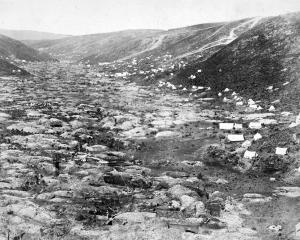As the annual celebration of fairer dealings, Fair Trade Fortnight, comes to a close, Tom McKinlay looks at the groundswell of support.
It is warm and quiet at the University of Otago Staff Club.
The smell of coffee wafts out from behind the counter. On top, glass jars contain small blocks of chocolate packed with the sort of instant energy the country's top minds sometimes need.
And when they do go looking for a little pick-me-up, staff and students at the university can be increasingly confident that they are also providing a hand up for others.
Last year the institution became the country's first ''fair trade'' university. As a result, the number and range of fair trade products being purchased via the University of Otago's approved supplier, Office Max, has increased greatly.
''Approximately two-thirds of university departments now choose to purchase fair trade products when they are buying cafeteria products,'' says Dr Hilary Phipps, the university's sustainability co-ordinator.
That means the tea, coffee and hot chocolate in staff rooms and used at meetings. In addition, fair trade products are available at all residential colleges and across a range of university outlets.
''Our support for fair trade is an example of the university's commitment to social responsibility,'' Dr Phipps says.
''Being a fair trade university also aligns with the emphasis that the university places on students gaining knowledge of ethics, ethical standards and social responsibility.''
The university is not done yet. Under consideration is buying fair trade clothing for its St David St gift store.
But it is not just at the seat of higher learning that consideration is being given to where the stuff of life comes from, and whether the purchasing arrangements were fair.
Dunedin became a ''fair trade city'' in 2009 and now boasts schools, churches and workplaces among its fair trade strongholds.
Fair Trade Dunedin City Steering Committee chairman Neill Ballantyne says Otago Polytechnic could become the country's first fair trade polytechnic, while the local Anglican diocese is attempting to become the first to claim fair trade accreditation.
And Dunedin is not alone.
According to Fairtrade Australia and New Zealand, more New Zealanders are choosing fair-trade certified products, with estimated retail sales increasing by more than 280% in the past five years. Average growth year on year for the same period is just over 40%.
Chocolate is still the big one. Last year sales of fair-trade certified chocolate reached $31.9 million, 70% up on the year before. That's 9% of all chocolate sold.
All up, shoppers spent $69.3 million on fair-trade certified products. And research by Colmar Brunton indicates 91% of New Zealanders back fair trade principles, believing overseas farmers should be paid fair prices.
If it wasn't chocolate, the conscious Kiwi consumer might well have been buying bananas.
Fairtrade Australia and New Zealand estimates retail sales of fair-trade certified bananas last year reached $5.7 million, 80% up on 2012.
The university's supplier Office Max has seen a 40% increase in the past two years in demand for fair trade products and a 50% increase in sales through government contracts.
Overall, fair trade products, mainly tea, coffee and chocolate, have nudged up to 2.5% of the company's cafe category, up from less than 2%.
Managing director Kevin Obern says it's a good fit with the company's broader efforts to operate in an ethical and sustainable fashion. Office Max's parent company has previously made the World's Most Ethical Companies list, issued by the Ethisphere Institute.
''I think there is a social element to it,'' says Mr Obern of the demand he is witnessing for fair trade products.
''People are saying, `you know what, I don't mind paying 10 cents extra for this product because I know a proportion of that is going to get back to the producer'.''
Another company operating in the ''ethisphere'' is All Good Bananas, the outfit behind the fair-trade branded bananas at the supermarket. It has also made the World's Most Ethical Companies list, twice.
The Grey Lynn, Auckland-based business has been supplying fair trade bananas to the likes of Foodstuffs supermarkets for four years, rightly supposing that New Zealanders' love affair with the banana would stretch to paying a little more for the yellow fruit if given a good reason to do so.
Director Chris Morrison said he and his two partners - brother Matthew, a former Treasury boffin, and Simon Coley, one-time marketing manager for 42 Below - identified not only that bananas were big business, but that the business could do with a little cleaning up.
''We did a bit of research and bananas is dominated by some of the biggest fruit companies in the world ... and there has been a fairly questionable history in the past of treatment of workers and [use of] chemicals and we thought there must be a different way to do this.''
They took heart from what they saw happening in Europe and the UK.
''In the UK about 33% of all bananas are fair trade and in Switzerland in fact 50% of all bananas are fair trade, so we are talking big numbers.''
Further investigations led them to a co-operative in Ecuador, called El Guabo, in which 400 small growers, who own their own land, like to cut out the middlemen and sell their organic bananas direct to fair-trade-minded distributors.
Fresh produce was something new for fair trade in New Zealand at the time but quickly found supporters, Mr Morrison says.
''We are very well-supported by the Foodstuffs group, which is about 55% of the supermarket trade and we have probably got about 5% of the market overall. I know that seems fairly small but it is a massive market, probably $160-180 million dollars worth of bananas sold each year in New Zealand.
''I think that consumers these days are really interested in the supply chain and also wanting to know what is behind brands. We have been very careful to tell stories about the growers and the benefits of actually choosing our bananas, or another fair trade product.''
Buying fair trade provides shoppers with a ready response to the familiar problems of the globe, Mr Morrison says.
''By purchasing a fair trade product, even if it is once or twice in their groceries each week, that is making a difference. And that really rings true for a lot of people.''
For the growers of El Guabo, the sustainable price they receive for their bananas lifts them out of subsistence living, he says.
''I think it makes a huge contribution not only in dollars but also in systems, in how people can work with different systems that are more equitable and can sort out some of the significant issues that we have in the world with people living below the poverty line. People are looking for solutions and this is trade not aid, this is really moving into long-term solutions where people are using business as a solution and we think that is a wonderful thing.''
The extra fairness does come at a cost. All Good's bananas cost about $1 more a kilogram in the supermarket.
''The consumer ... is in the supermarket at the end of the day and they have a decision to make,'' Mr Morrison says.
''And if they are feeling like that's a bit much, that's OK, we understand that, but there are others obviously quite happy to pay that, because that's part of what they feel good about.''
A fair go
Fair trade is a socially responsible way of doing business underpinned by 10 principles:
1. Creating opportunities for disadvantaged producers
2. Transparency and accountability
3. Fair trading practices
4. Payment of a fair price
5. No child or force labour
6. Freedom of association and gender equity
7. Good working conditions
8. Capacity building
9. Promoting fair trade
10. Respect for the environment












